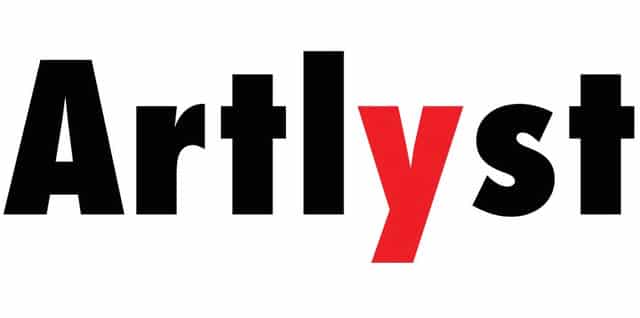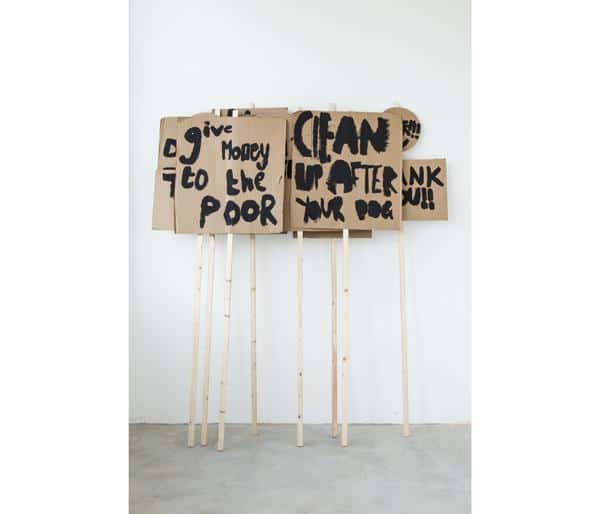Known for his proposals, documents which delineate a possible action or project, Peter Liversidge’s art is one of possibility. The proposals set the parameters, but what happens after his typewriter-typed letter leaves his hands is down to myriad factors and a heavy dose of chance.
In this four month project, Liversidge worked with sixty children aged between 8 and 9 from the Marion Richardson school in East London. Liversidge framed the project around rules, a subject of intimate acquaintance to most children. Using this as a framework, Liversidge encouraged the children to think about issues of democracy, community and the collective voice. The resulting mini exhibition is formed by a mixture of the product of their labour; banners and placards, and the artist’s documentation of the project. In the second category are typed song lyrics, a film of the children’s May Day 2014 performance at the Whitechapel Gallery, and the lists of rules the children wrote.
When read sequentially, the song lyrics begin with a focus on local issues pertaining to the children’s environment (‘Clean up after your dog’) and perennial childhood concerns (‘no more homework’), and go on to look beyond to a wider political agenda: ‘United Nations’ (the lyrics repeat the refrain ‘what if we take our problems to the United Nations?’). The artist’s hand in subtly shaping the way the children engage with the project is discernible from the lyrics. For example, the refrain in ‘I want to change my confidence’ shifts to ‘we want to change our confidence’ as the song progresses, reflecting a shift to thinking and give voice collectively, to shared problems.
The issue of confidence surfaces a number of times in the exhibition, perhaps reflecting both the concerns of the children and the artist’s consideration of the first steps in developing a political consciousness. Confidence is surely a requirement of meaningful political engagement, because without a sense of self-worth we are more likely to accept ill treatment and less likely to speak out on behalf of ourselves and others. Liversidge demonstrates a depth of understanding of the process of becoming a political subject through an economy of means here.
Spread across two small and unprepossessing rooms on the first floor of the gallery, this collection of material does little to grab the visitor’s attention on first sight. The proposal, a letter to Marion Richardson school laying out his intentions for the project, is the keystone of the display. There is a nagging lack of immediacy here, a practical necessity given that this is a documented project rather than a live performance but striking nonetheless. The show has the feel of the archive, and the painted cardboard signs fail to bring the energy of the staged event into the gallery space.
However, the benefit to the children is readily apparent, and the project comes across as one built around the children rather than the artist. Political art projects can feel like theoretical exercises in which the privileged artist talks to his or her privileged audience. By contrast, this project shows that politics is as much about the everyday as it is about more abstracted ideals, and makes a positive intervention at a local level with demonstrable success. Working within the children’s own language and activities, the songs and lists of rules displayed demonstrate a light-touch and sustained engagement, gently fostering youthful confidence and celebrating the power of the collective voice.
Peter Liversidge: Notes on Protesting – Whitechapel Gallery – until 6 June 2015
Words: Laura Purseglove photo courtesy of Whitechapel Gallery © Artlyst 2015 all rights reserved


